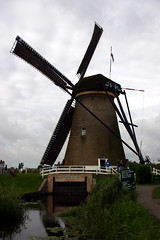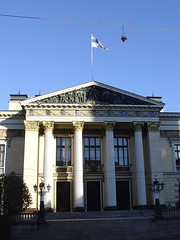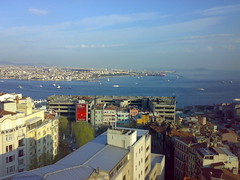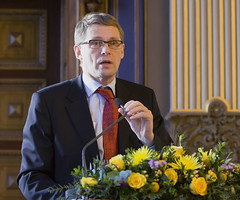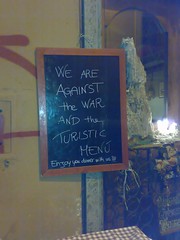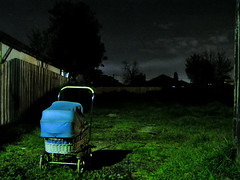Saturday, April 28, 2007
Keeping it together
i checked the issue with a friend of mine on Thursday afternoon. He is one of those wonderful Dutch people who both get paid and spend free time on citizen participation and democratic development. He was very clearly in favour of the monarchy. He used one of the most common arguments: the monarchy has played a big role in keeping the country together acting as a balancing force. "I don't know where we would be without them taking into consideration the turmoil of the last years", he estimated.
There was an interesting article yesterday in the main intellectual newspaper NRC Handelsblad on the way the monarchy builds their networks. They wrote about the dinners Crown Prince Willem-Alexander and his wife Princess Maxima host on a nearly weekly basis. Based on the article more than 100 key players of the Dutch society from politics, academia, culture and business have dined at their home in small informal gatherings. The article compared Willem-Alexander's networking to the work of his mother and concluded that Willem-Alexander is both building a network of people of his own generation and with Princess Maxima they do this in a very subtle and approachable manner.
The family Oranje is strongly involved in the society. They chair a number of foundations, give their support for societal projects and use silent power. The NRC guessed that Queen Beatrix would be stepping down next year and make room for Willem-Alexander. I am curious to see what that would mean for the visibility and popularity of the monarchy. As the NRC wrote, Willem-Alexander and Maxima started their networking from young politicians - the people who can decide on the future of the monarchy. They have a basis well built: especially Princess Maxima but also Prince Willem-Alexander have star-rocketing popularity rates and a clean but interesting public image.
Thursday, April 26, 2007
It's all made up
In my own statement i talked about the difference in handling public space in Finland and in the Netherlands. I pointed out that at the same time as the famous Dutch ignorance (I don't care what the people in the next table are doing if it does not interfere with my evening) leads to diverse settings and relaxed atmospheres, it also turns easily to arrogance like very often on KLM flights back to Amsterdam (I can be as loud as I want to because it is my right). That is one of the things that at the same time disturbs me and charms me in this country.
From the other statements a phrase stuck to me head: land van mens. For the non-Dutch people, it means the land of man. One of the speakers rightly so pointed out that the Netherlands has no natural attractions. All the things that people come here for are things built up by men (not in the gender-specific sense).
I kept pondering that all through yesterday. In Finland we are always very much linked to the nature. Whereas the Finns live from their natural resources, the Netherlands lives from interaction. Somehow that also explains why the Dutch debating culture is so much more developed than the Finnish ones. If we would have been forced to negotiate everything and everywhere (plus make our income from that), maybe we would also be less awkward in the presence of others. As a Dutch historian Geert Mak once pointed out in a discussion about Dutch tolerance:"It is based on a business model. It is not economically wise to make people with money and connections feel that they are not welcome." I guess he is right. We all know that from a nice salesperson you end up easily buying more.
Monday, April 23, 2007
Brighter four years?
I have been in somewhat opposition with my friends as I have been rather happy with the result of the elections and also with the government coalition. I think a liberal breath is only good for Finland. Maybe exactly for this reason I found myself being actually rather content with the direction that the cabinet has chosen. My only main disappointment is the part on culture which really does not say a thing. The great paradox is that the half page on creativity and culture is the least creative part of the 71-page pamphlet. But to express the reasons for my overall optimism, the followings are quotes from the programme with some comments of mine:
"When building the Finnish welfare state, the government wants to clarify the relationship between individual responsibility, shared responsibility and the responsibility of the society."
(Leftish people usually freak out with these wordings but I think this is exactly the major challenge for the Nordic welfare states, maybe adding corporate responsibility on the list.)
"Cross-generational and cross-border thinking is the leading principle of the blue-green government."
(As both of these themes are in the core of my own work and pose in my mind the biggest challenges to Western European nation states, my view is rather optimistic. This is exactly as the person I voted for stated things: the interest of Finland is the interest of the world.)
"Finland's foreign and security policy is based on good bilateral relations, strong influence in the EU's foreign and security policy and efficient multilateral collaboration and credible defense."
(The revolutionary move for Finland is abandoning the notions of neutrality and stressing relations. This for me is a sign of understanding the essence of international politics far better. The new directions shows wonderfully in the programme in the way climate change is addressed and how Russia is raised to a significant role. The government is now talking of a concept of wider security which also creates room for notions of soft power.)
Astonishing in the programme to me is also how fresh the environmental approach is. I believe for the first time there is a clear distinction between climate change and environmental policy. Climate change is now linked to energy, economics and employment - the cores of the programme rather than staying in the nature protection ghetto. I guess in the Finnish discourse culture still needs some advocacy in this sense.
I know a lot of people who would say that this is merely words and it is the actions that count. I tend to disagree with that simplification. As a political scientist for me the way things are addressed also creates the windows of opportunities and this fresher approach builds less on fear and more on empowerment. As an example, this government's programme explicitly states why we need an information society - a task that it's predecessor failed to do even if they even had a special cross-sectoral programme and a secretariat for that. Same goes both for diversity and climate change - they are addressed not as ideological good causes, but as issues crucial to GDP, security, welfare and happiness. This brings them to the forefront, stops the discussion on their necessity and gets us going.
I am optimistic but we shall see.
Thursday, April 19, 2007
Wonderful as itself
By coincidence I watched yesterday a reportage my good friend made for the Finnish TV on Istanbul last September when we both took part in a pop culture journalism workshop here. I could not be more proud of how she grasped the city through interviews with two young Istanbullers.
In the interviews they say wonderful things that I think should be shared and commented:
"We don't wake up every morning thinking about the European Union."
- this country is magnificent as itself and filled with people who strive for freedom and equality. The EU accession prospect might have speeded up some things but the modernisation agenda comes from within.
"I have friends all over the world but the Turkish friendships are somehow deeper."
- the way people get close with you here is something even I have not experienced elsewhere. It's real and sincere from the first moment on. And people take the time to share and to listen.
Wednesday, April 18, 2007
Subtle development
This calls for celebration. And my (virtual) flowers are sent to a very peculiar direction, the Centre Party. The party branded as the voice of the conservative farmers is the first one in Finnish history to elect a woman as Prime Minister (in 2003) and now lead a government with female majority.
The Centre Party seems to be now the voice of progress and optimism in Finland. They are the party that actually develop the society and suggest alternative agendas. For instance in this government they pushed for combining the ministries of employment and industry. And all this done with the leadership of a man who still in 2003 declared that being Prime Minister was a personal sacrifice, not something he ever wanted.
Matti Vanhanen, the Prime Minister from 2003 on and the head of the new cabinet is a modest man. He lives up to the Finnish values of sincerity and honesty to the extent of turning boring. But if one evaluates what he has done during the last years, one has to say that it was a clever move from the Centre Party to elect him as their leader. The economy is doing brilliantly. Even if he does not have the charisma to charm masses and win the presidential run, he does a good job in leading a team of ministers.
All and all, I am rather optimistic when it comes to the next four years with our centre-right government. I may be proven wrong but we shall see.
Monday, April 16, 2007
(Not Entirely) A Holiday in Rome
The walk to the Vatican was the saddest moment of my three-day work visit to Rome. The street leading to St. Peter’s is occupied by African young men selling fake bags, watches, tripods and sunglasses. A sense of panic emerged the moment I crossed the street as the men saw a policecar approaching on the bridge. They rushed to collect their merchandise inside a white blanket, threw it on their shoulders and ducked into the bushes. Heads popped up every now and then to see whether the patrol had left the street. As the police turned around the corner, it took less than two minutes for them to organise their stuff on the streets in neat lines and constantly glancing left and right for the next carabinieri. This is today’s Europe in most metropoles - also five minutes’ walk from the richest and most powerful institution in the world.
During Easter the Finnish TV showed by coincidence the classic film A Holiday in Rome so I was well prepared for my visit. Although my three days were slightly less eventful than Audrey Hepburn’s (no romance with an American journalist, no fights with the secret police and not a new haircut), I got a fair taste of what Rome is about.
As always, I was greatly more impressed by the people than by the Spanish Stairs of the Colosseum. As my colleague from the Italian TV phrased it, the Romans take more time with the people they meet than we tend to do in the North. Even if I was in town only for work, I was still guided through all the main sights, invited to dinners, introduced to a great number of people and taken around at night with a scooter. I also managed to have the ultimate Rome experience by ending up chatting with the group in the next restaurant table and going on the next evening to the opening of their literary cafe.
All and all Rome strikes me as a city of contradictions - ultimate poverty meets the richest institution in the world, glorious history meets the chaos and disorganisation of today and ancient Roman ruins meet Mussolini’s out-of-proportion fascist architecture. And yes, the best past in my life meets cannellonis worse than any airline would ever dare to serve. But the unsolvability (not sure if that is English) is what makes me want to come again.
Thursday, April 12, 2007
Strolling towards spring
"A distinguishing feature of the console is its wireless controller, the Wii Remote, which can be used as a handheld pointing device and can detect motion and rotation in three dimensions."
In non-nerdy language this means that you play tennis with a console as your racket. It is astonishing.
But now from Wii to we and to the best experience of the vacation. It was still relatively cold in Finland over Easter and the ice from the lakes was just starting to melt which meant that we spent most of our time inside. On the second day my sister said that she would take my nephew for a walk and I volunteered to go along. Five minutes later I found myself pushing the cart (or is it a trolley..no idea) without my sister on a muddy countryroad as she took a well deserved break to chat with my mum.
The wind was harsh, the sunshine was extremely bright, the wheels got stuck into the mud every now and then. But it was just superb. It was the first time I spent time alone with my nephew. He was looking at me curiously as I pushed him forward. It was just the two of us. I felt a sense of pride and joy when realising that my sister trusted me so much that she let a single urban guy take a 1,5-year-old for a walk without supervision.
My nephew did not cry one single time during the walk. I made it and we made it. To conclude: Kids and sisters rock.
Tuesday, April 10, 2007
Flamboyant boys and unbalanced girls
I have been spending lately a lot of time with people who are totally obsessed with music. I mean those who go from blog to blog and speak of bands that never enter Top 100 charts. The role I have taken often is to just write down names of bands they mention and then turn to my friends Google, MySpace and YouTube.
In one of those discussions someone turned to me a while ago and asked what kind of music I like. I was a bit puzzled in that situations but now I have a better answer. I have two categories:
- unbalanced women: Sort of women on the verge of a nervous breakdown like Martha Wainwright, Marit Bergman, Joni Mitchell, Carole King or even some stuff from Macy Gray.
- flamboyant and funny men: the people who do not take themselves to seriously but make witty and over-the-top music. I mean such as Patrick Wolf (see video), Rufus Wainwright, Mika, Antony and the Johnsons, Jonathan Richman and Sufjan Stevens.
More posts on music are going to follow as I make my way through my new albums and the CD of 127 songs that my pop wizard friend made me.
Monday, April 02, 2007
Plugged generation
The discussion is very often ridiculously simplistic. Either you have people putting it all in one basket without distinction (Commission report stating that young people publish their personal issues "on the Internet"). Then you have the ones blindsightidly focused on new things with no sense of proportion (YouTube has beaten television). And then you have people stating that there is nothing radical whatsoever in YouTube or so (it is just a phase). Oh and yes, you also have the concerned and worried: the ones thinking like Neil Postman in his book Amusing Ourselves to Death that we live in a egocentric "peek-a-boo world" where young people are immoral, lazy and have no concentration skills. This notion also has the victimising parental guidance subgroup.
Exactly for frustrations developed in the numerous debates it was a pleasure reading a new Demos report on the subject. Very often these pamphlets praising the digital revolution have no historical perspective which is why I was quite charmed by the findings. TheirSpace report also avoided the trap of falling into this nerdy technomasturbation of all the wonders of the Internet. To me this quote made the TheirSpace report stand out:
“Teenagers today can do things that teenagers ten years ago could not have imagined. As software and hardware have simultaneously become cheaper, more sophisticated and easier to use, this generation is burning self-shot home movies, composing and recording music and editing photos. There is nothing new about young people being creative and expressive (...) The difference is that by digitising their creative efforts this generation of young people can share the fruits of their labour with a worldwide audience.”
In the report the researchers seem to make a conscience move to stress the positive features of the digital revolution. I support strongly this slightly biased take. I believe that there is a paradigm change which is 90 % positive. It is a more engaging, non-hierarchical, participatory and revolutionary approach to the world than the ones dominating our political landscape currently. It is all about doing, testing, molding things for your own use and fitting to your own interests.
But what makes the change most remarkable to me is the high level of sharing. Take the picture of this post as an example. A colleague of mine asked a while ago why someone would put their own photos on a website for public use. My answer was very simple:"If it is a nice photo, I only have one question: why not? When you are credited for the use of your photo, where is the problem?"

